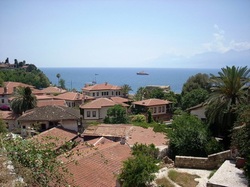Foreign Income & Assets

Many situations can cause an investor to get exposed to and possibly caught in the tax penalty net:
• Diversified portfolios that include foreign holdings
• Inheritances from abroad
• Immigrants to Canada who have retained foreign assets
• Canadians abroad who acquire foreign assets
There's one key form that investors need to check whether they need to complete and file, the innocuously titled Foreign Income Verification Statement Form T1135. As can be seen below, the form asks mostly about assets though there is a question about total foreign income.
Who is subject to the T1135?
• Individuals corporations, trusts and certain partnerships,
• Who is resident of Canada and thus liable to file a tax return in Canada, keeping in mind that a resident has to declare all world wide income.
What are the criteria for the T1135 filing requirement?
If the "who" above owned during the past tax year:
• Specific foreign assets; "foreign" means either where the assets are held, or who issued securities, like stocks and bonds issued by non-Canadian / non-resident companies or governments.
• Total value over $100,000 i.e. the sum of all assets together, not the value of any individual asset, but not counting any excluded property like what is in RRSPs and the like
• Value at any time during the past tax year, not as of the filing date, so that an asset that was sold during the year counts towards the calculation
• Cost, not the current market value so that investments bought for $80,000 and now worth $120,000 would be exempt
• Dollars in Canadian currency, the conversion rate being that in effect on the purchase date or deemed acquisition date, such as when an immigrant becomes resident
What must be reported?
• Amounts in foreign bank accounts;
• Shares in foreign companies;
• Interests in non-resident trusts;
• Bonds or debentures issued by foreign governments or foreign companies;
• Interests or units in offshore mutual funds;
• Real estate situated outside Canada; ... but this is only when it's primary purpose is not for personal use (see exclusion below)
• Other income-earning foreign property.
• US Roth IRA
What foreign investment property is excluded?
• Personal-use property, that is, any property used mainly for personal use and enjoyment, such as a vehicle, vacation property, jewellery, artwork, or any other such property
• Assets used only in an active business, such as a business inventory or the equipment and building used in a business
• RRSP and other registered account - LIRA, LRIF, LIF, RESP, TFSA, RPP - holdings; though the CRA Q&A specifically mentions only RRSPs, the other types of accounts also presumably qualify for exclusion
• Canadian mutual funds or ETFs that hold foreign stocks and bonds
• US Individual Retirement Accounts (IRA) and 401k
Source: http://howtoinvestonline.blogspot.ca
• Diversified portfolios that include foreign holdings
• Inheritances from abroad
• Immigrants to Canada who have retained foreign assets
• Canadians abroad who acquire foreign assets
There's one key form that investors need to check whether they need to complete and file, the innocuously titled Foreign Income Verification Statement Form T1135. As can be seen below, the form asks mostly about assets though there is a question about total foreign income.
Who is subject to the T1135?
• Individuals corporations, trusts and certain partnerships,
• Who is resident of Canada and thus liable to file a tax return in Canada, keeping in mind that a resident has to declare all world wide income.
What are the criteria for the T1135 filing requirement?
If the "who" above owned during the past tax year:
• Specific foreign assets; "foreign" means either where the assets are held, or who issued securities, like stocks and bonds issued by non-Canadian / non-resident companies or governments.
• Total value over $100,000 i.e. the sum of all assets together, not the value of any individual asset, but not counting any excluded property like what is in RRSPs and the like
• Value at any time during the past tax year, not as of the filing date, so that an asset that was sold during the year counts towards the calculation
• Cost, not the current market value so that investments bought for $80,000 and now worth $120,000 would be exempt
• Dollars in Canadian currency, the conversion rate being that in effect on the purchase date or deemed acquisition date, such as when an immigrant becomes resident
What must be reported?
• Amounts in foreign bank accounts;
• Shares in foreign companies;
• Interests in non-resident trusts;
• Bonds or debentures issued by foreign governments or foreign companies;
• Interests or units in offshore mutual funds;
• Real estate situated outside Canada; ... but this is only when it's primary purpose is not for personal use (see exclusion below)
• Other income-earning foreign property.
• US Roth IRA
What foreign investment property is excluded?
• Personal-use property, that is, any property used mainly for personal use and enjoyment, such as a vehicle, vacation property, jewellery, artwork, or any other such property
• Assets used only in an active business, such as a business inventory or the equipment and building used in a business
• RRSP and other registered account - LIRA, LRIF, LIF, RESP, TFSA, RPP - holdings; though the CRA Q&A specifically mentions only RRSPs, the other types of accounts also presumably qualify for exclusion
• Canadian mutual funds or ETFs that hold foreign stocks and bonds
• US Individual Retirement Accounts (IRA) and 401k
Source: http://howtoinvestonline.blogspot.ca

